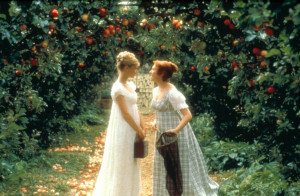Controversial characters: Emma Woodhouse
[dropcap]W[/dropcap]e pit two writers “tête à tête” to discuss some of literature’s most divisive characters in our regular column, “Controversial Characters”.
Pro-Emma: “If Emma’s methods are dubious, her good intentions are not“
It’s rare to find a female Austen fan who didn’t harbour a secret desire to emulate Elizabeth Bennet: it’s still rarer to find one who did picture herself as an Emma Woodhouse. Emma is nosy, interfering and, above all, naïve; and yet I’d argue that these qualities, alongside her often-overlooked (but nonetheless numerous) positive ones, are those in which we can all recognise ourselves.
 Emma is introduced to us as “handsome, clever, rich, with a comfortable home” – four of the qualities in herself to which she assigns the littlest value. Throughout the novel she is shown to be artistically talented, witty and more than capable of standing up for herself, and yet still these are not as important to her as the ability to read and construct social situations. Vanity, as Mr Knightley observes, is not among Emma’s faults.
Emma is introduced to us as “handsome, clever, rich, with a comfortable home” – four of the qualities in herself to which she assigns the littlest value. Throughout the novel she is shown to be artistically talented, witty and more than capable of standing up for herself, and yet still these are not as important to her as the ability to read and construct social situations. Vanity, as Mr Knightley observes, is not among Emma’s faults.
If we picture our own friendship circles, it’s likely that we can all think of one person whose self-assigned role it is to know the minutiae of everyone else’s business: the one who is, like Emma, constantly on the lookout for any hint of a potential romance to further or discuss.
And yes, it is easy to dismiss this sort of behaviour as interfering or irritating, but how can we overlook the absolute absence of malice in her character? Every one of her attempts to engineer a relationship stems from genuine pleasure in making the people she loves happy. Some argue that her motives are selfish, and indeed, a sense of self-satisfaction might be an undeniable side-effect of successful matchmaking as in the case of Miss Taylor and Mr Weston. Other evidence of Emma’s personality points, however, in a more commendable direction.
Emma is absolutely loyal to her loved ones
A staunch supporter of the Taylor-Weston match from the beginning, she not only accepts but actively encourages the ‘loss’ of her closest friend to marriage. More tellingly, she initially refuses to marry Mr Knightley until her father’s death to spare the latter from distress. Surely even if Emma’s methods are dubious, her good intentions are not.
Perhaps most importantly, however, is Emma’s willingness to learn from her mistakes. Her lack of self-awareness – she is blind to her own romantic feelings as well as those of her friends and acquaintances – is the root of most of her problems in the novel. When she comes to see the problems she has caused, however, her capacity for remorse and her determination to put things right are limitless.
Emma’s flaws, as well as her better qualities, are what make her relatable; and if we find her irritating, perhaps it’s because we recognise some of those flaws in ourselves.
Fiona Farnsworth
Anti-Emma: “Emma is selfish, conceited, and incredibly snobbish“
Emma Woodhouse may be handsome, clever, and rich, but above all of these things she is a snob.
From the seat of social power afforded by her manifold privileges, Emma surveys her acquaintances with punishing judgment. The men may be handsome and gallant, but their fortunes are far too small to be worthy of her attention. The women are pretty, but nowhere near as clever or as refined as Emma. Her friends are often boring, inferior, or pitiable, and when Emma graces them with her presence it is an act of philanthropy. Emma seems to believe that her time is the best gift that she can bestow upon these lowly folk – never once does it occur to her that anybody might not view her with the utmost veneration.
 Worst of all Emma’s attitudes is her one towards Harriet. From the outset, Harriet is a project for Emma, someone whom she can remodel in her own, irreproachable image. In Emma’s worldview, people like Harriet are nothing more than accessories for her own self-aggrandisement; hardly a minute seems to pass without Emma comparing herself to Harriet, and remarking that she is “not clever” and a “Nobody” by birth. Moreover, not a second’s thought is spared for Harriet’s wishes, to ask whether Harriet wants to be “improved”. Emma’s privilege leaves her with an incredible sense of self-entitlement; why should she consider Harriet’s feelings when Harriet is so far beneath her?
Worst of all Emma’s attitudes is her one towards Harriet. From the outset, Harriet is a project for Emma, someone whom she can remodel in her own, irreproachable image. In Emma’s worldview, people like Harriet are nothing more than accessories for her own self-aggrandisement; hardly a minute seems to pass without Emma comparing herself to Harriet, and remarking that she is “not clever” and a “Nobody” by birth. Moreover, not a second’s thought is spared for Harriet’s wishes, to ask whether Harriet wants to be “improved”. Emma’s privilege leaves her with an incredible sense of self-entitlement; why should she consider Harriet’s feelings when Harriet is so far beneath her?
This haughty attitude culminates when both Harriet and Emma fall in love with the same man. Without a breath of hesitation, Emma is willing to demote Harriet from best friend to rival, all the while forming a mental list of how Harriet is the inferior of the two.
This is a character who has obviously never heard of ‘sisters before misters’
Some might argue that Emma is an example of Bildungsroman, and that it is therefore necessary for Emma to be immature and egotistical at the beginning: how else is she to grow and develop by the novel’s end? This is true – and Emma does grow and develop – but what she develops into is no more likeable! She may become less wont to play god in the lives of her friends, but her preoccupation with class is present even in the final chapter.
Despite all that I have said, I will make one concession: that the character of Emma is what makes Emma a good book. She’s selfish, conceited, and incredibly snobbish, but all of these things mean that she is interesting. As a protagonist, Emma is a success. As a person, however, she is not somebody with whom I would want to spend a moment of my time.
Carmella Lowkis
Image Credits: Header (barnesandnoble.com), Image 1 (interactive.wxxi.org), Image 2 (Fanpop).

Comments (1)
I am entirely with Carmella, Emma Woodhouse is a monster